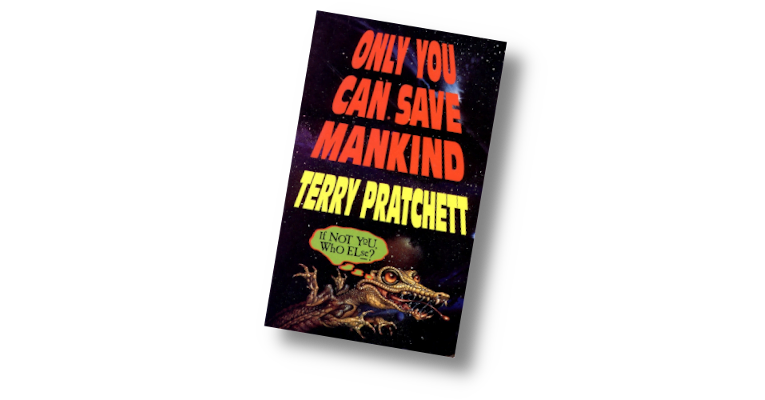Johnny Maxwell is an extremely ordinary 12 year old child in 1995. He goes to school, he struggles with homework, he pirates videogames cracked by his nerdier friend Wobbler, and he avoids his parents shouting at each other by submerging himself in the glow of his screen. And it’s all going perfectly well for him as he plays his way through Wing Commander 2 Only You Can Save Mankind until one afternoon, the Kilrathi Screewee reach out to talk to him.
And they want to surrender.
This isn’t part of the game, at least, as far as anyone else has said. It’s not anything that Wobbler’s seen. It’s not in the manual. And back in the day, videogames sometimes did things you didn’t expect, for really specific, interesting reasons and there wasn’t some sort of online compendium you could pop open to check out all the details of how these games work.
And that means that Johnny is confronted by a mystery that may just be a really interesting thing a game does.
Or maybe something else.

I’m going to spoil chunks of the rest of the book, though not exactly how it concludes. If you want to go read the book, it’s on Audible, it’s on Amazon, it’s on Google Books, and I like it a lot. It is however, a book extraordinarily of its time. It’s a book from 1995 about a twelve year old, playing videogames back when Amiga and Amstrad and Macintosh were all names to mention in the same breath. It’s also a book from when Terry Pratchett himself just didn’t understand women so well, and that means there are moments when a major character who’s a girl says some stuff that’s…
Well.
It’s very ‘precocious 12 year old’s vision of sexism,’ and that can make her feel pretty embarrassing to look back on now, especially because there are ways in which the story goes out of its way to prove her wrong. Like, it’s not like it makes the story markedly worse? But at the same time there’s a tragic kind of missed opportunity: That the story could have still kept what was important to Johnny while also showing more nuance and depth for the girl character.
Who I’m not naming, because it’s? It’s complicated?
Anyway. I like this book a lot and I’d like to recommend it, but with the caveats that it’s a white guy from 1995 writing about videogames and is a bit of a thicko about some of the topics he handles. Just stuff that hasn’t aged great.
Nonetheless, after this, there be spoilers.

Only You Can Save Mankind starts out with the mystery of ‘what is this computer game doing,’ then dives sharply into magical realism. When Johnny falls asleep, he dreams his way into the game; but his dreams are not of the game as a videogame, with his hands on the keys, but in the cockpit, flying through the game, and shooting down other players as he tries to defend the Screewee fleet on its way to safety.
It is a hell of a hook. It’s a hook that doesn’t work any more, because the idea of videogames having genuine mysteries is pretty much past. That’s not the only thing about it that doesn’t work – like Johnny being able to pick out a single player based on the fact that she’s the only girl he’s seen who has anything to do with videogames.
There’s this twofold narrative, though, and much of it is in the background. See, while Johnny is grappling with this videogame and its literal zeroest of stakes, there’s this constant and ongoing murmur about what his day to day life is like. What he, and Big Mac, and Wobbler, and Yo-Less and later Kirsty are all grappling with, and how even in the context of a bunch of nobodies like that, Johnny is the forgettable one. And that he’s the forgettable one means that there’s this steady struggle around him of what he calls Trying Times.
Johnny’s parents are going through a divorce. And it’s not a pretty one. It’s loud, it’s painful, it’s shouty, and through the whole of it, they are so focused on each other that they themselves see their son as invisible. That his problems are basically… impossible to even address with the people around him. They think he doesn’t notice, they hope he doesn’t notice, and they hope there’s a lot of stuff he doesn’t notice.
As Johnny eats mac’n’cheese, and watches the TV show him images of the Gulf War 1.0, a real war that tries to look like a videogame, and then he goes and plays a videogame that tries to be like a real war. The pressure of being invisible mounts up on him, and eventually, something strange happens.
I did say magical realism, because it’s very important to know that the events in the story did happen, but also happen in Johnny’s dreams. It’s an imagined story – because they all are – but it’s all a bit more shamanic than you may think. Johnny is a character who sees the world differently to other people, but that doesn’t mean that he’s seeing a world that isn’t real. Pratchett rejected the idea that this story was ‘just in his imagination.’

Terry Pratchett is a name typically associated with the enduring Discworld series of fantasy novels. There’s more to his ouvre, mind you – I talked about Nation on this very blog, for example, and he wrote Dodger, basically Dickensian fanfiction, towards the tail end of his career. There’s also his science fiction stories, like Dark Side Of The Sun, and Strata, and The Carpet People. He won awards for The Amazing Maurice and his Educated Rodents, which sort of set the tone for young-adult novels in the Discworld universe. There were also the trilogy known as the Bromeliad, Truckers, Diggers and Wings.
And between the nomes and the changelings, there was Johnny.
There are three stories in the Johnny cycle: Only You Can Save Mankind, Johnny And The Dead and Johnny And The Bomb. These books all play with Johnny as a shamanic character, the person who may not solve everything, but who listens to people – and that means he gets to see the mysterious stuff that’s all already there. They’re also all built around very much interesting things that already exist in our world, with just the faintest outline of the mythical to pull them out. A cemetary is in a very real sense, a place where the dead are, and their memories linger, and all you need to do is find ways to listen to them.
There’s a narrative under it all, strange and clear, as you read these books. They’re books about how everything we have is interesting, everything connects to other things. There’s a mysteriousness, a spirituality to just being alive, and when Johnny looks at the world, he sees the things that are really there, not because he’s special, but because he’s paying attention.
Johnny is a character who is defined as being remarkable just because he’s listening to people.
That vision of a world of interconnected possibilities, of the remarkable and exceptional, is sort of how I wound up getting to grips with the world myself as I grew up, as I started to see that there didn’t need to be miraculous explanations, just the connections to the real complexities of reality that exist. Now I’m a media studies scholar, and part of my job is talking about the way that humans interact with media, and through media, literally everything I wonder how much of that spiderwebbing, interlacing attitude that the world is a complicated thing that we navigate through the way we tell ourselves stories stems from literally this book.
In hindsight, I cannot imagine a book that was quite so exceptionally made for me, even though I know for a fact it was written for Rihanna Pratchett. This was a book about a twelve year old boy afraid of the future and hiding in a computer in his bedroom with a bunch of pirated videogames that let him forget those problems, who had no friends at school, who finds himself caught up in nightmares of the idea of videogame narratives as if they were real, tormented in the night by this feeling of needing to execute some enormous quest in order to make good on his moral obligations, and uh, rather than repeat that entire phrase in a comical goof I’m just going to say I read it when I was pretty much that.
Like, I envied Johnny his list of four friends.

Every few years, a game will come out that’s meant to have some sort of metatextuality to it. Like, go check it out, there’s this videogame and it is doing things that videogames don’t do, because they recognise that hey, hey, they’re a videogame, isn’t that exciting? Doki Doki Literature Club and Undertale and so on play with the form in ways that I find myself becoming incredibly bored with. And I think part of why I’ve always been so unimpressed with that narrative of ‘what if videogames were like real life?’ or attempts to be metatextual in the same way, is because I got over that when I was twelve.
See, it isn’t just that Only You Can Save Mankind is about a kid who lives out videogame experiences in his dreams, it’s then with the immense smashing conclusion that it’s not a game, even the games. Like a game saying ‘oh, you made assumptions, did you,’ just feels tired to me, because when I was a child, a book – not even a videogame! – told me yeah, of course I did. Of course you did, because that’s how everything works. And none of that diminishes what it is.
You might never win, but at least you could try. If not you, who else?